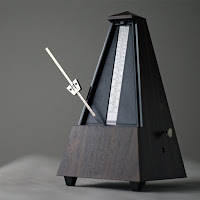The good news is that a beautiful tone is not required for this skill. Neither is stunning dynamic control, perfect intonation, or sensitive phrasing. In fact, you don't even need your trumpet! You just need to develop the unshakable skill of rock-solid timing.
When under pressure, this is often one of the first strikes against us. While concentrating on accuracy, we quickly forget about timing. Or while focusing on tone, we rush and slow down unintentionally.
One dreaded comment from the audition committee: "We would have advanced you were it not for your poor rhythm." Superior tone, phrasing, intonation, and articulation are useless without a steady pulse.
Since our instrument is not needed to develop this skill, we can work on this anywhere. This should be a fun game. We learn to quickly nail every tempo, maintaining rhythmic consistency under the steady hand of our professor, the metronome.
Again, we don't need to be in the practice room to perfect this skill. When our rhythm is solid, it is ready for music-making. Rhythmic security should be automatic.
Don't let the trumpet rob you of being able to demonstrate great rhythm.

















